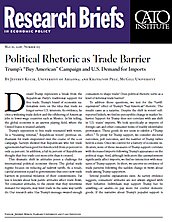Trump’s opposition to free trade resonated with voters. In a “stunning reversal,” Republican voters’ previous enthusiasm for trade evaporated over the course of the 2016 campaign. Surveys showed that Republicans who felt trade agreements had been good for America fell from 56 percent to only 29 percent. In addition, a full 85 percent of Republicans thought that free trade cost more jobs than it created.
This dramatic shift in attitudes poses a challenge for international political economy theory. The global trade regime focuses on reducing ad valorem tariffs. As a result, careful attention is paid to governments that erect new trade barriers in potential violation of their commitments. Far less is known about how public attitudes affect trade flows. Yet consumer attitudes, to the extent that they determine demand for imports, may limit trade in the same way tariffs do. Our research asks: Has Trump’s message swayed enough consumers to shape trade? Does political rhetoric serve as a kind of informal trade barrier?
To address those questions, we test for the “tariffequivalent” effect of Trump’s “buy American” rhetoric. The results came as a surprise. Despite the shift in voters’ selfreported beliefs, we find no perceptible change in market behavior. Support for Trump does not correlate with any shift in U.S. states’ imports. We look specifically at imports of foreign cars and other consumer items of readily identifiable provenance. Those goods do not seem to exhibit a “Trump effect.” To proxy for Trump support, we consider electoral outcomes, poll outcomes, and the number of Trump rallies held in a state. Once we control for a battery of economic indicators, none of those measures of Trump support correlate with decreased imports following Trump’s appearance on the political stage. And, although indicators like unemployment significantly affect imports, we find no interaction with measures of Trump support. In short, we uncover no evidence of trade patterns following the sudden change in views about trade among Trump supporters.
Several possible explanations exist. As survey evidence suggests, consumers’ attitudes are not always aligned with their behavior. Individuals may support Trump but be unwilling—or unable—to pay more for costlier domestic goods. If the narrative about Trump’s populist support is 2 correct, then working-class voters in many areas of the country may not be able to afford the luxury of “buying American.” Some research claims that commentators overstated Trump’s working-class support. However, it remains true that incomes for many Americans have remained static (or even fallen) since the Great Recession, suggesting that consumption decisions could be influenced more by affordability than by ideology.
In addition, Trump’s unpredictability has some industries hedging against future uncertainty. In 2017, the steel industry stockpiled supply, given fears of new protection. In the same way, car companies may be trying to get ahead of any new entry barriers the White House has planned. Indeed, car manufacturers—including the “Big Three” Detroit firms— have already expressed their opposition to Trump’s NAFTA strategy. Because many firms rely on assembly operations in Mexico, those firms may be importing “extra” goods before trade becomes more expensive.
The findings encourage greater caution when interpreting the polls. Rapidly changing beliefs are probably more evanescent and, therefore, less likely to translate into behavior. Future research could test this possibility by using survey evidence to better test individuals’ willingness to act on their beliefs on trade. One possibility is that purchases of larger-ticket items such as cars are more immune to ideological changes. But for now, we find little evidence that Trump’s economic nationalist rhetoric, which has been credited for shifting minds, has similarly affected demand.
NOTE:
This research brief is based on Jeffrey Kucik and Krzysztof Pelc, “Political Rhetoric as Trade Barrier: Trump’s ‘Buy American’ Campaign and US Demand for Imports,” November 2017, https://ssrn.com/abstract=3067518.

